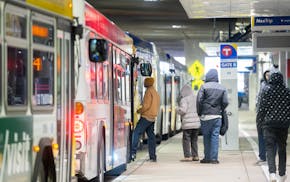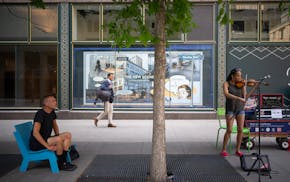In the middle of a government shutdown, an agency that hadn't cut a paycheck in four weeks held a job fair.
Not the greatest timing, officials at Transportation Safety Administration headquarters in Bloomington conceded. But they'd been short-staffed even before the shutdown, and the spring break travel rush is coming up fast.
Early Saturday, they opened the doors.
In rushed hundreds and hundreds of hopeful job seekers, looking for government work.
"I have faith. I have faith," said Steve Alford of St. Louis Park, one of the 423 optimists who dropped off an application for 40 job openings. It's work that pays $18.38 to $25.55 per hour and comes with a raft of government benefits — although no one at the TSA has collected a paycheck since Dec. 22.
It will take weeks to screen the applications and run background checks. By then the shutdown should be over, right?
"We tell them this shutdown will end, eventually," said David McMahon, TSA's deputy federal security director for Minnesota.
The shutdown will end, the applicants agreed, in a sunny counterpoint to the gloom coming out of Washington.
TSA officials had figured they'd be lucky to lure 200 people. But Saturday's turnout dwarfed the applications turned in at similar shutdown job fairs in Seattle, Nashville and Denver.
The shutdown "doesn't bother me," said applicant Bruce Nelson. "That's going to change pretty soon."
Nelson drove in from Brooklyn Center to find the parking lot packed and a two-hour wait to get on a computer for the next step in the interview process.
"I thought with the shutdown, this place would be pretty much empty," he said. Self-employed and looking for a new career after the "economy sort of took me out of my old field" after 30 years, Nelson found the idea of airport security work appealing and was unfazed by the fact that the work isn't paying anything right now.
"I like the idea of customer service and just being around people. I've been at a desk too long," he said. "I thought, 'Let's try it.' "
Saturday's job fair was staffed by a mix of screeners working unpaid overtime on a weekend and office staff who had been sent home as "nonessential" a month ago and who jumped at the chance to come in and help out.
The shutdown will end, they assured each other and everyone else. All shutdowns end.
The Armed Forces Service Center at the Minneapolis-St. Paul International Airport has started feeding the unpaid TSA screeners, air traffic controllers and customs agents free hot dogs and chips twice a week.
Passengers have started dropping off canned goods and gift cards for the airport's new TSA food shelf before they empty their pockets and step through the scanners.
And still, the TSA workers keep working. Even after a month, sick calls are rare, and only a handful of workers have quit.
But they were short-staffed even before the shutdown, and even with everyone still doggedly showing up for work, lines stretched long for travelers heading off for the holiday weekend.
"We're the only one who can keep air travel going," said TSA worker Christopher Marchiniak. "If all of us walked out at once, I don't know what would happen."
Atlanta found out what would happen. It took 90 minutes to inch through security last Monday after a wave of TSA agents called in sick. On Friday, the line to get through the checkpoints in Seattle stretched to the parking garage. So many screeners called in sick in Houston, they had to close one of the security checkpoints.
MSP travelers seem know they lucked out. One woman, McMahon said, dropped off a stack of thank-you notes for the agents whose unpaid labor made it possible for her and her husband to travel to a friend's funeral in Boston.
Local TSA agents take a certain grim pride in the fact that they're still doing their jobs, even if Washington isn't.
"None of us should have to be going through this. But unfortunately, it is happening and we have to stick together," said Marchiniak, who has been a TSA agent for a year and a half. The bills are piling up at home, but he said most creditors have been understanding.
It doesn't pay much at the moment, but it's work Marchiniak would recommend to anyone thinking about putting in an application. He took this job to help people and keep them safe, and that's what he intends to do.
"I come to work with a smile on my face every day," he said. "People ask me, 'How can you smile?' I just come to work and I help people out."
jennifer.brooks@startribune.com • 612-673-4008 Follow Jennifer on Twitter: @stribrooks
An Isanti wedding venue closed without warning. Now these couples have 'nowhere to go.'

Brooks: A tale of 124 hoarded Minnesota cats has at least a hundred happy endings

Brooks: The end of the line for Minneapolis' longest-serving bus driver and the start of a new adventure

Brooks: If Uber and Lyft let Minnesota down, maybe Metro Transit will pick us up

